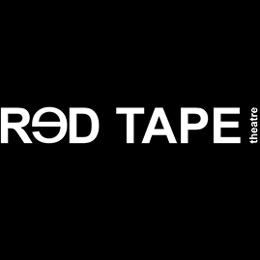
In a cavernous church Gymnasium in Lakeview a little theater company is planning for the future. Minutes from six years old, Red Tape Theatre boasts impressive programming for a theater of any size: a dedicated space, a new play development series, an education program, a fourteen member ensemble, and a role as host in a progressive bid for more collaboration among Chicago's small theaters.
How exactly did this happen? Artistic Director James Palmer remembers one way the company bypassed much of the time it takes ensembles to forge mutual trust and a shared vocabulary. "We spent probably two years in what I consider the dorkiest endeavor in theater history," Palmer explains. "We said, 'we're going to read two books on theater theory at a time and lock ourselves in a room for three hours to talk and fight it out there, so when we get back in the rehearsal hall we're on the same page.'"
The rehearsal hall, in this case, is also the performance space and an important aspect of what makes Red Tape Theatre unique. Indeed, the company is in some ways well understood as a series of solutions for and interpretations of its unusual home — the wide, open 2 nd floor gymnasium of St. Peter's Episcopal Church. Their recent adaptation of Henrik Ibsen's Enemy of the People , for instance, used its three acts to showcase three different stylistic and structural approaches to the space. First a typical "fourth-wall" naturalistic presentation, second an environmental exploration of the lobby that turned intermission into a town hall meeting, and third a "promenade"-style finale that lead the standing audience through the set of the first act to reveal a dark and stylized arena for the play's climactic final moments. Palmer admits the company has had varied success in navigating its own resources, but is proud of the lessons they've learned and hopes that their different approaches have contributed to the audience's experience of the company and its work, "There's anticipation when you're waiting for those steel doors to open," he says, "because you never know what you're going to walk into."
One of the company's long-term goals is to continue to explore these possibilities by encouraging playwrights to write specifically with Red Tape Theatre – its ensemble and its home - in mind. Toward this, Red Tape sponsors its Fresh Eyes Project, a sensitive if almost anti-commercial approach to new-play development in which the customary culminating staging is not prepared for an audience. "Typically," according to Palmer, "you bring a playwright in [for a workshop] with a director and actors and there's a staged reading at the end. The problem is that two weeks before that public reading the director has to stop worrying about the playwright and start thinking as a director getting a show ready for an audience." Red Tape's solution has been to keep this final performance private and so dedicate the entire workshop to the writer and to the growth of the script.
Which is not to say that plays developed by the Fresh Eyes Project never see the light of day. The first play of Red Tape's upcoming season (not yet announced) came out of this process, and Palmer looks forward to a day in which the majority, if not all, of Red Tape's productions will originate in the Fresh Eyes Project. Palmer places this day about five years into the future, but he insists, "we're not rushing it...One thing that's very important to us is timeliness. We'll be ready."
To find out more about Red Tape Theatre and to be the first to catch their season announcement, you can go to their website, follow their blog , or become a fan on Facebook.
Benno Nelson
